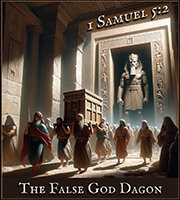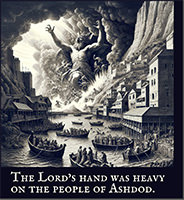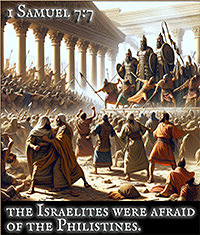1 Samuel 5:1–7:17 . . . Bible Study Summary with Videos and Questions
“The Sacred Ark in a Cart”
Following up on last week's account of Israel's Defeat (see our summary of 1 Sam. 4:1–22), Israel had suffered a devastating military loss at the hands of the Philistines, including the Philistines' theft of the ark of the Covenant of the Lord. It was their most sacred, holy object; it represented the Lord being with his people. The Israelites wondered how their God could have allowed them to suffer so much, concluding that it was because they didn't take the ark of God into battle with them. They believed that ark's presence — something of a large good-luck charm — would have made the difference. Confidently, the Israelites commenced fighting. Fearfully, the Philistines rose to the challenge, dreading possible defeat. The text tells us that 30,000 Israeli foot soldiers were killed, along with Chief Priest Eli's sons: Priests Hophni and Phinehas. When Eli learned that his sons died and that the ark had been taken, he fell from his seat and broke his neck from the fall. He was followed in death by his daughter-in-law when she gave birth to a son she named Ichabod (meaning "gone is the glory") because the ark had been taken.
We'll now see in chapter 5 that the Philistines took the ark to Ashdod (33 miles west of Jerusalem), placing it next to their statue of Dagon, a fertility god. We should appreciate at least one important element in this first chapter: Its purpose was to demonstrate the superiority of God (Hebrew Yahweh) over Dagon. Their placing the ark next to Dagon's statue first allowed God to humble Dagon (vv. 1–5), then humiliated the Philistines who worshiped it (vv. 6–12). In chapter 6, the Philistines sent the ark back to Israel, using a method designed to determine whether it was God or chance that had brought upon them all their trials. Irreverence and disobedience regarding the ark resulted in divine judgment being cast upon the Israelites; their initial response to this judgment was similar to that of the Philistines. Chapter 7 starts with the ark being placed in storage so that all would know that the Israelites' spiritual revival and military victory that would follow wasn't the result of the ark having magical power but of Israel’s repentance and faith in God.
How Does One Deal with a Sacred Object? (5:1–12)
[Note: Click the link to This Week’s Passage near the bottom of this page to read today’s Scripture.]
The Philistines didn't know the real God who had authority over all people and all nations. The principal god of the Philistines was a false god called Dagon, which was widely believed to be a fish-god; it was an inanimate statue. The ark, however, was a very holy object; it was a box that enclosed documentary evidence of Israel’s covenant (agreement) with God. Roughly four feet long, gold-plated, and carried on poles that hung through rings on its sides, the ark was created to house the tablets of the Ten Commandments and serve as a representation of God’s covenant with his people. As we read these passages, we should all agree that things get pretty weird, right? The ark was placed next to the Dagon statue (v. 2); Dagon, Ashdod’s idol-god, fell to the ground, directly in front of the ark and became damaged (v. 3); the same thing happened the following night, causing additional damage to the statue (v. 4); the threshold onto which Dagon had fallen twice became revered as holy (v. 5); then, God afflicted those living in the city of Ashdod with tumors (v. 6). Somehow, the Philistines believed that they could move the ark wherever and however they pleased and that all of God’s goodness would be contained in a four-foot-long box for their benefit and virtue.
When people arrived early the next morning to worship their god, Dagon, what a shock they had! Intending to praise him for the victory he'd seemingly given them over Israel, there, in its own temple, the Asdodites' idol laid prostrate in the dirt before the ark of God. The real God had shown his anger against that false god. Imagine the excuses and explanations made in defense of their god: It must not have been properly positioned. Could it have been an earthquake? Whatever the reason, one can be sure that their god had certainly been securely anchored in its temple when the Philistine priests left that day. For sure, there'd be no more face-plants for Dagon.
Such events should have caused the Philistines in Ashdod to be very afraid. However, they still refused to change their behavior; they considered Dagon to be their god and attempted to keep God's ark in their own pagan town. Trouble continued for some time before anyone did anything. In the end, they called together all the rulers of Philistia to ask them what should be done next (v. 8). They saw that the real God, the God of Israel, was acting against them and their false god. Still they refused to serve the real God; they wanted to keep their false god, Dagon.
So, how does one deal with a sacred object? Does a real God fall down, break, and have to be picked up from the ground? Does a real God have to have its pieces glued back together? . . . If those pagan priests had thought wisely, they'd have realized that Dagon’s image belonged on the scrap heap or in the city dump. Why would a “god” need to be physically handled and set upright by its subjects, thereafter carried off for repairs, because it had become broken? Yet the priests didn't humble themselves. Neither did they confess that the God of Israel was a true, living, unbreakable God. They didn't stop worshiping a piece of wood, stone, or metal. Instead, they pronounced as "holy" the temple threshold on which the idol had fallen and broken. Go figure!
Verse 6 introduces a devastating plague that was inflicted by the Lord on the Philistines. Whatever the plague type, the Philistines were eager to be rid of it. Their leaders knew that the plague from which the Ashdodites were suffering was caused by the presence of the ark of God in their midst. So, the rulers reached a political decision: to send the ark of God to another location, to Gath, the next major Philistine city. We're clearly told in v. 9 that their sending of the ark to Gath was followed by another outbreak of the plague, possibly tumors in the groin (see Septuagint). The plague followed the ark's travels in Philistia.
It was decided that the ark should be sent away, this time to the city of Ekron. But the Ekronites weren't that gullible (v. 10). We read in vv. 6, 7, 9, and 11 the mention of “the Lord's hand or God's hand.” The phrase refers to the Lord in action, afflicting the Philistines because of their idolatry. It also shows the utter superiority of the Lord over Dagon. The Philistines finally realized that, because of the way God brought judgment on them, the ark must no longer remain with them in their land — it must go back to Israel.
The Ark Must Be Returned to Israel (6:1–7:2)
We might be surprised to learn from 6:1 that the ark remained in Philistine possession for seven months. If a plague of tumors had been afflicted by God onto people in five cities, why did they wait so long to deal with the power of God's hand and avoid his wrath? The only remaining option became clear: The ark had to be returned to Israel. But "How?" they wondered. So the Philistines finally sought advice from diviners (priests who specialized in god-specific dealings) who surmised that, when the Philistines return the ark of God to Israel, they must also offer an appropriate sacrifice to make up for their bad mojo.
The Philistine diviners gave the lords of the land very specific instructions regarding the ark's return, which were derived from the outworking of their own pagan theology. The ark mustn't be sent away empty, they advised. It must be accompanied by a guilt offering. They counseled the Philistine lords to appease God by giving the Israelites a gift in the form of a guilt offering, albeit of gold. This was to be no mere offering of gold, as if it were a bribe. Instead it was to comprised of five golden replicas of items specifically related to the inflicted tumors (perhaps resembling groins or hemorrhoids) and five gold idols of mice or rats (that appeared with the extent of death and disease in five cities). They assured the lords that this would appease Israel's God, resulting in the healing of Philistines from plagues. If this action succeeded in stopping the plague, then the Philistines would be assured that they'd have found the explanation for God’s anger and their suffering.
It's interesting to learn in 6:6 of the Philistines’ knowledge about Israel’s history and God. They were well aware of the exodus. They knew that Pharaoh and the Egyptians developed hardened hearts against God who brought numerous plagues upon them. So they didn't want to make that same mistake. Thus, they suggested letting the ark go back to Israel, along with their guilt offering. The Philistines were completely willing to admit that the ark of the God of Israel was the source of their suffering. They'd “let the ark go” the same way the Egyptians let the Israelites go, but they wouldn't send the ark away without a plan that would work only if the ark was assuredly the cause of their suffering, and only if God was able to override the course of nature.
In vv. 7–9, we find the plan's elaborate details. The priests advised the Philistine lords to put the ark, along with the guilt offering, on a new ox cart, which was to be drawn by two milk cows, both with still-nursing calves, directly toward Israel. The calves were to be locked up, separated from their mothers. The cows that had been yoked to the cart would be allowed to go wherever they chose. If they followed the course of nature, they'd head back and return to their captive calves. But if the plagues had been caused by God, who wanted the ark returned, then the cows would forsake their calves and drag the ark and cart directly to Israel. It would then be safe to assume that all of the Philistines’ troubles were caused by Israel's powerful God and that they'd be wise to let the ark go. If the cows didn't head for Israel, the Philistines probably felt that they'd be able to keep the ark, and that the enduring plagues were simply coincidences.
So, which direction did the cows go? They headed straight for the road leading to Beth Shemesh in Israel, lowing as they went, not turning to the left or to the right (v. 12). The Philistine lords followed from a distance until they observed the cart and its cargo stopping in Israelite territory. Realizing that the ark had finally been returned to Israel, the Beth Shemesh Israelites who witnessed their ark's return were ecstatic. Those reaping in the fields were the first to see it. The Israelites there quickly and joyfully offered up a sacrifice to God, using the cart's wood to fuel the fire and the cows that drew it as the offering. It was a great and festive occasion, up until the spirits of the Israelite worshipers became quickly subdued when a plague broke out also on the people of Beth Shemesh. Sadly, some of them had carelessly and disobediently looked into or upon the ark of the Lord, causing a significant number of inhabitants there to have been struck dead.
The survivors were horrified. Why did God strike so many worshiping Israelites dead? If people died for such reasons, why should the ark remain among them? Who'd be able to stand in the presence of the Holy God? And to whom would they send the ark?
Samuel’s Part in Israel’s Revival (7:3–17)
We don't read anything of Samuel from 4:2 to 7:2. He apparently wasn't present when the ark was taken in battle; nor did he take part in the Philistines' humiliation, detailed in chapters 5 and 6. But, thankfully, Samuel played an important role in Israel's revival, as described in chapter 7. Israel was forced to look elsewhere for its security, since God had taken away their security blanket, the ark. Samuel suggested where Israel was to look (v. 3), calling upon the nation to return to the LORD with all their hearts, putting away all their pagan idols. The people did that, purposing to serve God alone and to look to only him for their deliverance from the Philistines (v. 4). Samuel then gathered all of Israel to Mizpah, not far from his home in Ramah, promising that he'd pray to the LORD on their behalf. The people drew water, poured it out before the LORD, fasted, and confessed (v. 6). They developed a greater need to spend their time praying, to strengthen themselves spiritually, than eating, to strengthen themselves physically. They did this by fasting.
When the Philistines heard that Israel had assembled at Mizpah (v. 7), their rulers went there to attack them. The Philistines had been victorious in waging war with the Israelites before; they assumed they'd be successful once again. The Israelites were frightened when they learned that the Philistines were coming. They didn't have the ark to take to war with them (and, besides, it didn’t work the last time they tried to use it), so all they could do was cast themselves upon God and trust in him, appealing to him on the basis of "grace not magic." They cried out to Samuel (v. 8), beseeching him to pray to the LORD on their behalf, asking God to deliver them from the approaching Philistines.
The Israelites were completely unprepared for this attack, but the LORD seemed to bring about a great thunderstorm (v. 10) that caused great confusion among the Philistine warriors, enabling the Israelites to overcome them. God's deliverance was apparently entirely supernatural (v. 10), probably to impress the people with his ability to save them in a hopeless condition and to strengthen their faith in him. Philistine domination over Israel ended (v. 13). They never invaded Israel during all the days of Samuel. And he continued (v. 15) as Israel’s hearty leader all the days of his life.
† Summary of 1 Samuel 5:1–7:17
This passage covers the period of the Ark of the Covenant’s captivity with the Philistines and the ensuing deliverance of Israel. In chapter 5, the Philistines take the Ark to Ashdod and place it in the temple of their god Dagon. However, the presence of the Ark brings humiliation to Dagon as his statue falls and is damaged repeatedly (vv. 1–5). The people of Ashdod further suffer severe plagues, including tumors, demonstrating the power of Israel’s God over the Philistine god (vv. 6–9). The Ark is then moved to Gath and Ekron, but similar calamities follow, prompting fear and pleas for its removal (vv. 10–12).
In chapters 6 and 7, the Philistines, on advice, send the Ark back to Israel with a guilt offering, using a cart pulled by cows that head straight home, confirming God’s hand upon the Ark (6:1–21). The Ark returns to Beth Shemesh and then Kiriath-Jearim, restoring a measure of peace to Israel. Yet spiritual revival is still needed. Samuel calls Israel to repentance in chapter 7; the people gather, confess sins, and fast. God answers by delivering them from the Philistines in battle, causing panic and defeat among their enemies as Samuel prays (7:1–17). This section highlights God’s sovereignty over false gods, his judgments against idolatry, the importance of repentance, and his power to save through faithful leadership.
Key points with verse references:
• The Ark is placed in Dagon’s temple, and God humiliates the idol by causing it to fall and break (5:1–5).
• The Philistine cities Ashdod, Gath, and Ekron suffer plagues and tumors due to the Ark’s presence, leading to fear and pleas for its removal (vv. 6–12).
• The Philistines send the Ark back with offerings, and it returns safely to Israel, stopping at Beth Shemesh and then Kiriath-Jearim (6:1–21).
• Samuel leads Israel to repentance; the people confess their sins, and God delivers them from the Philistines in battle (7:1–17).
• This narrative underscores God’s supreme power over idols, the necessity of genuine repentance, and his faithfulness in delivering Israel through his prophet.
This Week's Passage
1 Samuel 5:1–7:17
New International Version (NIV) [View it in a different version by clicking here; also listen to chapter 5, 6, and 7, narrated by Max McLean].
† Summary Video: “The First Book of Samuel”
† Watch this introductory video clip created by BibleProject on bibleproject.com.
- Q. 1 Why do the Philistines play "hot potato" with the ark?
- Q. 2 Why weren't the Levites afflicted by the ark (v. 15) while laymen were (v. 19)?




